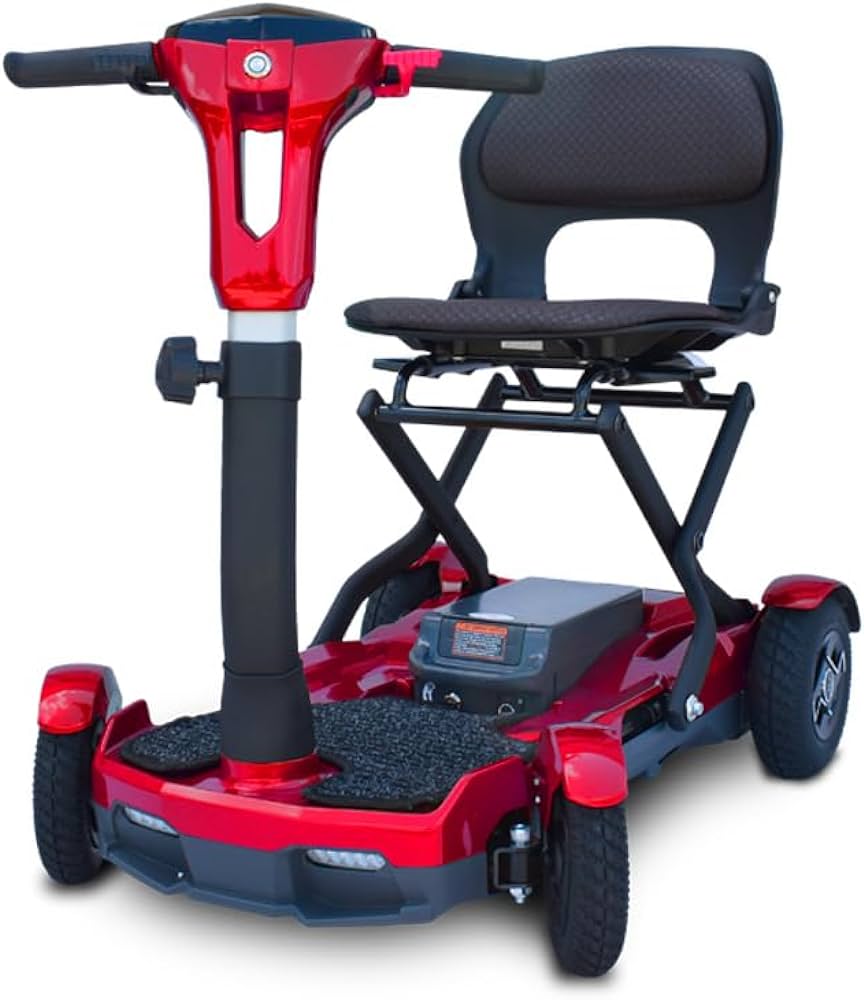To qualify for a mobility scooter, you must be unable to use a cane or walker and unable to operate a manual wheelchair. You must also be able to get in and out of the scooter safely and have the strength to sit up and operate the controls.
Additionally, you may need to meet certain requirements set by Medicare or other insurance providers.
Essential Requirements For Qualifying
To qualify for a mobility scooter, you must be unable to use a cane or walker or operate a manual wheelchair. You should be able to safely get in and out of the scooter and have the strength to operate it.
Medicare’s wheelchair and scooter benefit may cover the cost if you meet these requirements.
Physical Limitations
If you’re wondering how to qualify for a mobility scooter, one of the essential requirements is having physical limitations that make it difficult for you to use a cane, walker, or manual wheelchair. This may include conditions such as arthritis, muscle weakness, or limited mobility in your legs or hips.
To determine your eligibility, you should consult with your doctor or primary care provider (PCP) who can assess your physical limitations and recommend a power-operated scooter if it meets your needs. Your PCP may also need to sign an order or prescription after a face-to-face office visit to confirm the medical necessity for a mobility scooter.
Ability To Operate
Another crucial requirement for qualifying for a mobility scooter is the ability to operate it safely. This means that you must be able to get in and out of the scooter without difficulty and have enough strength and coordination to sit up and operate the controls.
If you have limited strength or dexterity in your hands, your PCP may recommend alternative options such as a joystick control or assistive devices that can make operating the scooter more manageable for you.
Medical Evaluation
Before obtaining a prescription for a mobility scooter, you will typically need to undergo a medical evaluation to determine whether it is medically necessary for your condition. This evaluation is usually conducted by a physician or therapist.
The purpose of the evaluation is to assess your mobility limitations, daily activity requirements, and overall health to determine if a mobility scooter would significantly improve your quality of life and allow you to perform essential tasks independently.
In conclusion,
If you believe you meet the essential requirements for qualifying for a mobility scooter, it’s important to consult with your healthcare provider to discuss your specific needs and explore the options available to you. They can guide you through the process and help you obtain the necessary documentation to support your eligibility for a power-operated scooter.
Types Of Government Assistance
When it comes to qualifying for a mobility scooter, there are several types of government assistance programs that can help individuals meet their needs. These programs aim to provide financial support to individuals who have difficulty with mobility and require a mobility scooter for their daily activities. Let’s explore some of the most common government assistance programs for qualifying individuals.
Medicare Coverage
If you are a Medicare beneficiary, you may be eligible for coverage of a mobility scooter under Medicare Part B. Medicare provides coverage for durable medical equipment, which includes mobility scooters, if certain criteria are met. To qualify for Medicare coverage of a mobility scooter, you must have a doctor’s prescription stating that a scooter is medically necessary for you. Additionally, you must be able to safely operate the scooter and have mobility limitations that prevent you from using a cane, walker, or manual wheelchair effectively.
Personal Independence Payment
The Enhanced Rate Mobility Component of Personal Independence Payment (ERMC PIP) is a government assistance program in the United Kingdom. This program provides financial help to individuals who have difficulty walking or getting around and require a mobility scooter. To qualify for ERMC PIP, you need to undergo an assessment that determines your eligibility based on your mobility limitations and the impact they have on your daily life.
Disability Living Allowance
The Higher Rate Mobility Component of Disability Living Allowance (HRMC DLA) is another government assistance program in the United Kingdom. This program provides financial support to individuals with disabilities who have difficulty walking or getting around. To qualify for HRMC DLA, you must undergo an assessment to determine your eligibility based on your mobility limitations and their impact on your daily life.
No matter which government assistance program you may be eligible for, it is important to consult with a healthcare professional or your primary care provider to understand the specific eligibility criteria and requirements. They can help guide you through the application process and assist you in providing the necessary documentation and prescriptions needed to qualify for a mobility scooter under these programs.
Process Of Approval
To qualify for a mobility scooter, you must meet certain criteria such as being unable to use a cane or walker and being capable of safely getting in and out of the scooter. Medicare guidelines require a face-to-face evaluation with a physician or therapist to determine medical necessity.
Prior Authorization
In order to obtain a mobility scooter, you may need to go through a process of prior authorization. This means that you’ll need to get approval from your insurance provider or Medicare before you can receive your scooter. The prior authorization process helps ensure that the mobility scooter is medically necessary and that you meet the required criteria. It’s important to note that the specific requirements for prior authorization may vary depending on your insurance provider or Medicare.
Prescription Requirement
To qualify for a mobility scooter, you will also need a prescription from a healthcare professional. This can be a physician or therapist who will evaluate your condition and determine whether a mobility scooter is medically necessary for you. The face-to-face evaluation will help the healthcare professional assess your ability to use a cane or walker or operate a manual wheelchair. It will also determine if you are able to safely get in and out of the mobility scooter and operate the controls. The prescription is a crucial step in the approval process, as it provides the necessary documentation to prove the medical necessity of a mobility scooter.
Role Of Doctor
Your doctor or primary care provider (PCP) plays a vital role throughout the process of obtaining a mobility scooter. They are the ones who can determine the medical necessity of a mobility scooter for you. After conducting a face-to-face evaluation and determining that a mobility scooter is necessary, your doctor will need to sign an order, prescription, or certificate. This signed document is essential in gaining approval from your insurance provider or Medicare. It’s important to have open communication with your doctor and discuss any mobility limitations you are experiencing in order to get the necessary documentation for the approval process.
Factors Considered For Qualification
In order to qualify for a mobility scooter, you must meet certain criteria. If you are unable to use a cane or walker, or operate a manual wheelchair, and can safely get in and out of the scooter while being able to operate its controls, you may be eligible.
It is recommended to consult with your doctor to determine if a mobility scooter is medically necessary for you.
Safety Considerations
One of the primary factors considered for qualification for a mobility scooter is ensuring the individual’s safety. It is essential that the person can get in and out of the scooter safely. This means having the physical ability to maintain balance and stability while transferring in and out of the scooter seat. Additionally, the individual should have sufficient upper body strength and coordination to operate the controls effectively. Safety is a significant concern, as it directly impacts the person’s ability to use the scooter independently and navigate their surroundings without any risks.
Ability To Sit And Operate Controls
Another crucial factor for qualifying for a mobility scooter is the individual’s ability to sit and operate the controls comfortably. The person must have the physical capability to sit upright in the scooter seat for extended periods without experiencing significant discomfort or fatigue. Additionally, they should have the dexterity and coordination to operate the scooter controls, such as the steering handlebars, throttle, and brakes. Being able to manipulate these controls effectively ensures that the individual can maneuver the scooter safely and navigate through various environments with ease.
Other Considerations
Private Insurance Coverage
If you are not eligible for Medicare or if your Medicare coverage is limited, it’s important to check whether your private insurance will cover the cost of a mobility scooter. Some private insurance plans do provide coverage for mobility scooters, but the specific requirements and limitations may vary.
Availability Of Mobility Scooters
Before you can qualify for a mobility scooter, you need to ensure that they are available in your area. Check with local medical supply stores or mobility equipment providers to find out if they have mobility scooters in stock. You can also explore online retailers that sell mobility scooters and check their shipping and delivery options to your location.
In addition, consider the different types and models of mobility scooters available. There are various options designed to meet different mobility needs, such as compact scooters for indoor use or heavy-duty scooters for outdoor use. Research and compare the features, specifications, and prices of different scooters to find the one that suits your needs and budget.

Credit: www.walmart.com
Frequently Asked Questions On How Do You Qualify For A Mobility Scooter
What Makes You Eligible For A Mobility Scooter?
To be eligible for a mobility scooter, you must be unable to use a cane or walker, or operate a manual wheelchair. You should be able to safely get in and out of the scooter, and have enough strength to sit up and operate the controls.
Medicare may cover the cost.
What Do Need To Qualify For A Mobility Scooter?
To qualify for a mobility scooter, you must be unable to use a cane, walker, or manual wheelchair. You should be able to safely get in and out of the scooter and have the strength to operate it. Medicare may cover the cost if it is medically necessary.
How Long Does It Take Medicare To Approve A Mobility Scooter?
Medicare approval for a mobility scooter can vary in time. Generally, it takes around 45 days, but it can be longer depending on the evaluation process and documentation required.
Do You Need A Prescription For A Scooter?
No, you do not need a prescription for a scooter. However, if you need a mobility scooter as part of your medical treatment or for daily activities, such as meal prep or bathing, a face-to-face evaluation with a physician or therapist is required to determine if it is medically necessary.
Conclusion
To be eligible for a mobility scooter, you must meet certain criteria. If you cannot use a cane or walker, or operate a manual wheelchair, a power-operated scooter may be an option for you. It is essential to be able to safely navigate in and out of the scooter and have the strength to operate the controls.
Additionally, the Enhanced Rate Mobility Component of Personal Independence Payment (ERMC PIP) and the Higher Rate Mobility Component of Disability Living Allowance (HRMC DLA) are factors to consider. Consult with your healthcare provider to determine if a mobility scooter is suitable for your needs.

